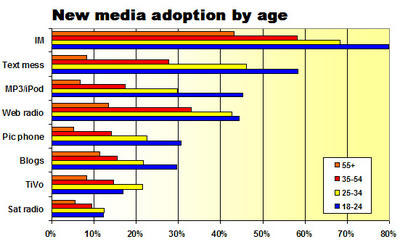Scratching the itch to twitch
These rules of thumb apply when gauging the impact of such thumb-intensive new media as text messaging.
In this era of rapid techno-innovation, the challenge for advertisers – and the media companies chasing their dollars – is figuring out how to get, and sustain, the attention of an increasingly twitchy and fickle crowd of what researcher Joe Pilotta calls “media nomads.”
Joe may not know exactly how to sell stuff to the nomads, either. But at least he knows where to look for them, thanks to an online poll he conducted for BIGresearch, an independent market-analysis company.
In the poll, Joe found that 79.8% of respondents between the ages of 18 and 24 “regularly or occasionally” use instant messaging, 58.3% use text messaging, 45.3% use iPods or similar portable audio devices, 30.6% use picture phones and 29.6% read blogs.
Full details of Joe's findings are in the table below, but remember that this was a self-administered online poll, which, by definition, is biased in favor of the technically intrepid and doesn’t reflect the behavior of any of the remaining Luddites lurking out there.
“The 18 to 24 year olds are digital nomads who have adopted new media more readily than any other age group,” says Joe. “Not only do they use new media more, they are influenced by it much more than any other age group when it comes to making purchasing decisions.”
Accordingly, marketers and media companies lusting for young consumers need to learn how to successfully blend new-media tactics with their conventional print and broadcast initiatives.
“The usage of new media among younger age groups creates a marketing dilemma for marketers who are wedded to traditional media,” says Joe. “Users of new media are using radio, magazines and newspapers more, while TV has suffered the overall negative effect.”
Research shows that young people are avid media multi-taskers. That is, they are likely to be simultaneously chatting on IM, listening to a CD and yakking on their cell phones while the TV blares in the background and they are “reading” a book for school.
So, it isn’t hard to reach them by one means or another. The hard part will be getting them to pay heed, given their increasingly abbreviated attention spans.
While none of the above is shockingly new, I was astonished to learn that 43.1% of people aged 55 or older use instant messaging and that I was not among them.
Frantically concerned that I was being left behind, I consulted one of my youthful friends, who is a mere 52. He advised me that the coolest thing nowadays is Skype (rhymes with “hype”), which combines free IM with free international phone service to 131 million-plus users.
In one quick download, I vaulted from near-obsolescence back to the bleeding edge. So, now you can skype me at admutter.
The service works great. The only question is whether the proper spelling for the present tense of the verb is skypeing, skyping or skypping.

3 Comments:
A big challenge for advertisers interested in new media will be audience measurement. After all of this time Nielsen is still trying to get TV audience measurement right, and they've been trying for over 50 years.
Take a look at Richard Restak's The New Brain. He recaps brain scan research that suggests media multi-tasking is rewiring brains of all ages, and he suggests that ADD is becoming not so much a dysfunction as the new cognitive framework of our society.
Very interesting material.
Post a Comment
<< Home